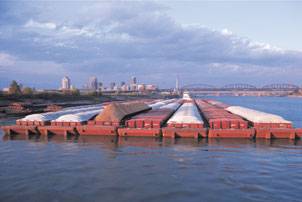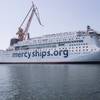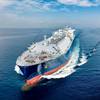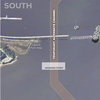MarineNews Insights with AWO’s National Advocacy VP
By Raina Clark, from the November 2010 edition of MarineNews
MarineNews spoke with Jennifer Carpenter, Senior Vice President of National Advocacy for the American Waterways Operators (AWO), about the organization’s strategic plan, how it is going about increasing public awareness for the industry and what you can do to help.
What is AWO 21?
AWO 21 is AWO’s strategic plan, approved by our Board of Directors in October 2009, which lays out our vision, mission, values, goals, and objectives. In other words, it describes why AWO is here, what AWO members care about, and how we’re going to spend our time and our money as a trade association. AWO 21 says that there are seven core things that we will do: promote positive public awareness of the tugboat, towboat and barge industry; lead and support members in continuously improving safety, security and environmental stewardship; promote our industry’s interest with Congress, the Administration and federal agencies; influence state and federally-proposed regional initiatives that broadly affect our industry; promptly inform and engage AWO’s membership on public policy issues; and govern and manage the association effectively and efficiently. That’s what our $5 million budget, our 20-member staff, and our members’ “sweat equity” are here to accomplish.
What does your national advocacy plan for AWO members look like?
At AWO, we plan our advocacy work with an eye toward building capacity and achieving results on priority issues defined by our membership. To build capacity, we are continually refreshing and executing plans to develop a strong, nationwide network of AWO member grassroots relationships with Members of Congress and their staffs, increase the size and reach of the AWO PAC and political fundraising program, and build relationships with decision makers in the Administration and throughout the key federal agencies that impact our members’ business. To achieve results on priority issues — like effectively managing the transition to towing vessel inspection, developing more practical ways of regulating ballast water and other vessel discharges, and working with our partners at Waterways Council, Inc., to improve the reliability and ensure needed funding to modernize and maintain our inland waterways infrastructure — we develop and execute issue-specific gameplans.
But, as important as it is to plan, it’s also essential to be nimble. Six months ago, none of us knew that we were on the verge of mounting perhaps the most intense advocacy campaign in AWO history, to beat back damaging legislation in the wake of the Deepwater Horizon disaster that would have a devastating effect on AWO members, even outside the oil transportation industry. It was totally unplanned, absolutely critical, and a dramatic reminder of why it’s so important to focus on building capacity — you never know when you’re going to have to draw on every advocacy resource available to you. We’ve been successful to date in stopping bad legislation that would hurt our industry, but we’re not out of the woods yet. The challenge will continue in the lame-duck session of Congress and into the 112th Congress.
What are the obstacles to better political and public awareness of the industry?
First, the average American doesn’t take a barge to a business meeting or sit in traffic behind a tow on the way to work in the morning. Unless they live in a port or river city — and, frankly, even if they do — most people don’t have the same day-to-day contact with barges and towing vessels that they do with airplanes, trucks, and even trains. That means that we, as industry advocates, need to make an extra effort to tell our industry’s story — a story of incredible economic, environmental, security, and quality of life benefits for American citizens. But, a second reason is that, historically, our industry hasn’t been very comfortable doing that. We’ve tended to define success as being quietly excellent — moving cargo safely, reducing highway congestion, and keeping prices low for shippers and consumers. We still have to do those things, but we can’t be quiet about them anymore. We have to tell our industry’s story in ways that make it relevant to people in Washington, D.C., and around the country.
What do you think are the best ways to improve the public’s awareness of waterborne commerce in this country?
We need to start by leveraging our strengths. Those strengths include the knowledgeable, passionate men and women who make their livelihoods in this industry and can tell its story with an authenticity that no one else can; our industry’s customers — shippers who depend on the safe, low-cost, efficient transportation of their products and who have resources and relationships that we do not; and opinion leaders in communities across the country where the importance of barge transportation is clear. We need to bring all of these resources together to tell the story of our industry in a way that is creative, assertive, and relevant to the issues that Americans are concerned about today. I’m very excited about a new “Public Affairs Leadership Council” that we’re just getting underway to help us get our arms around this challenge. The Council is the brainchild of AWO’s Chairman of the Board, George Foster of JB Marine Service, and chaired by a respected and forward-looking industry leader, Mark Knoy of AEP River Operations. Mark and his Council of senior executives from tugboat, towboat and barge companies in both the brown-water and blue-water business are going to help us identify opportunities that we can seize and resources that we can leverage to expand our capacity to tell our industry’s great story to the public.
What can AWO members and stakeholders do to help?
Start with what you know best: your company, your community, your industry. Recognize that your employees are a tremendous base of grassroots advocacy support and terrific ambassadors for our industry. Give them the information they need to communicate with their Members of Congress on industry issues, and make sure they know what AWO is doing to try to make their industry stronger. Use the relationships you have in your community — civic associations, business groups, local media — to get the word out and build allies. Especially in this age of information overload, what makes a message relevant is its personal connection to the listener. Our industry’s messages will always be more relevant, and more memorable, when they’re delivered by people from the community. Your local paper doesn’t want to run an op-ed by someone from a Washington, D.C.-based trade association; they want to hear from an employer who provides jobs in the community the paper serves.











